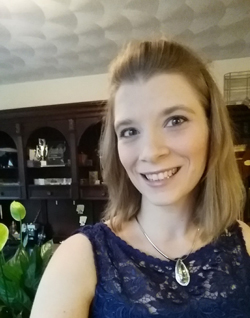Ann Walkup Receives 2020 Paul W. Zitzewitz Excellence in K-12 Teaching Award
FOR IMMEDIATE RELEASE
 The American Association of Physics Teachers (AAPT) announced today that the 2020 Paul Zitzewitz Excellence in K-12 Physics Teaching Award winner is Ann Walkup, a physics teacher at Cranston High School East, Cranston, Rhode Island. This award is in recognition for contributions to pre-college physics teaching and awardees are chosen for their extraordinary accomplishments in communicating the excitement of physics to their students.
The American Association of Physics Teachers (AAPT) announced today that the 2020 Paul Zitzewitz Excellence in K-12 Physics Teaching Award winner is Ann Walkup, a physics teacher at Cranston High School East, Cranston, Rhode Island. This award is in recognition for contributions to pre-college physics teaching and awardees are chosen for their extraordinary accomplishments in communicating the excitement of physics to their students.
Regarding her selection for this award Walkup said, "I am honestly very surprised and humbled by the award. I feel I do what every other good teacher does, try to provide the best possible learning experience for her students and turn them into lifelong learners. I am honored that someone finds what I do worthy of such a prestigious award."
Educated at Connecticut College with a BA in Physics and an MA in Physics Education, she became a life member of AAPT in 2002. Walkup was a member of the Rhode Island Department of Education (RIDE)/ Charles Dana Education Center (University of Texas at Austin) Next Generation of Science Standards science curriculum writing team for six years. She has been instrumental in translating the NGSS into a viable and rigorous physics curriculum for both Cranston Public School Students and the Students of Rhode Island. Her work on curriculum includes the writing of our Foundations for Physics scope and sequence and the units of study. This year, she is a member of the STEAM committee at Cranston High School East (CHSE). Their focus is to collaborate with teachers from different departments to develop units and lessons that integrate Science, Technology, Engineering, Art, and Mathematics, and to make these lesson available to all the CHSE community.
Through her impeccable lesson planning and forms of assessment Walkup has helped many students in the Cranston Public Schools acquire the necessary skills to engage in the study of physics. Her dynamic approach to the teaching of physics allows all students from myriad backgrounds to excel in physics. She has instructed a diverse student body in multiple levels of courses from early enrollment, to honors, to independent studies, to comprehensive, to self-contained courses for students with special needs. She is a champion of STEM teaching and her delivery and style should be emulated by all physics educators.
Walkup currently co-teaches the CHSE Ballroom Dance club and is a member of USA Dance, as well as a certified Bob Ross Instructor in oil painting. She also plays harp and has performed with the CHSE orchestra. In 2012, she founded the Robert and John L. Walkup Scholarship, an annual award given for excellence in physics, in memory of her father and uncle. She is a previous winner of the 2008 AMGEN Award for Science Teaching Excellence. Currently, she is working towards a Graduate Colored Stones degree from the Gemological Institute of America.
About the Award
Established as the Excellence in Pre-College Teaching Award in 1993 then renamed and endowed in 2010 by Paul W. and Barbara S. Zitzewitz, the Paul W. Zitzewitz Award for Excellence in K-12 Physics Teaching recognizes outstanding achievement in teaching pre-college physics.
About AAPT
AAPT is an international organization for physics educators, physicists, and industrial scientists—with members worldwide. Dedicated to enhancing the understanding and appreciation of physics through teaching, AAPT provides awards, publications, and programs that encourage practical application of physics principles, support continuing professional development, and reward excellence in physics education. AAPT was founded in 1930 and is headquartered in the American Center for Physics in College Park, Maryland.
For more information: Contact David Wolfe, Director of Communications, dwolfe@aapt.org, (301)209-3322, (301)209-0845 (Fax), www.aapt.org.
Contact
David Wolfe
Director of Communications
- dwolfe@aapt.org
- (301) 209-3322
- (301) 209-0845 (Fax)
- https://www.aapt.org
More News
- October 9, 2025 - Meghan DiBacco Named as 2026 Recipient of the Doc Brown Futures Award
- October 9, 2025 - Raeghan Graessle awarded the Homer L. Dodge Citation for Distinguished Service to AAPT
- September 29, 2025 - 2026 Oersted Medal Shared by Ruth Chabay and Bruce Sherwood
- September 25, 2025 - 2026 Phillips Medal Award to Dwain Desbien
- July 28, 2025 - TCNJ Physics Department Earns Award from Physics and Astronomy SEA Change Program

